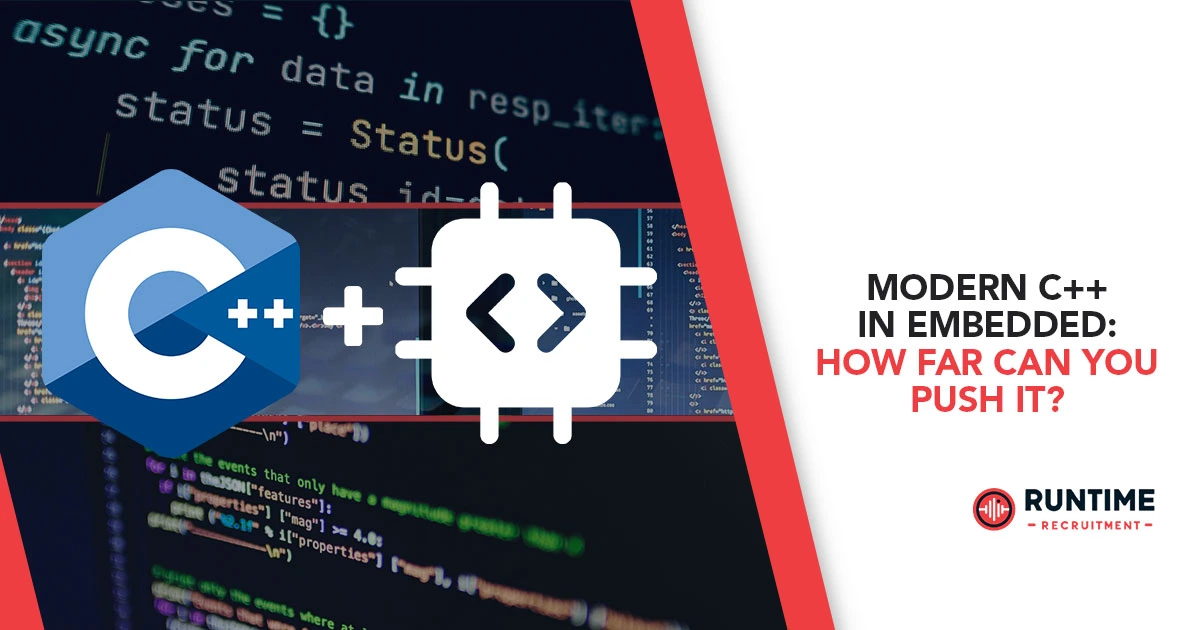Embedded systems have long been dominated by C, with occasional forays into C++ when object-oriented programming (OOP) was deemed necessary. However, the perception that C++ is too bloated, slow, or unpredictable for resource-constrained environments persists.
But Modern C++ (C++11, C++14, C++17, and beyond) has introduced features that can make embedded development more expressive, safer, and sometimes even more efficient than traditional C. The question is: How far can you push Modern C++ in embedded systems without sacrificing performance, determinism, or memory efficiency?
In this article, we’ll explore:
- Key Modern C++ features relevant to embedded systems
- Performance and memory trade-offs
- Real-world use cases and limitations
- Best practices for adopting Modern C++ in embedded
1. Why Consider Modern C++ for Embedded?
1.1. Type Safety and Abstraction Without Overhead
C++ provides stronger type safety than C, reducing bugs related to implicit conversions and pointer misuse. Features like:
- enum class (scoped enums)
- constexpr (compile-time evaluation)
- Strongly-typed containers (std::array vs. raw arrays)
help catch errors at compile time rather than runtime.
1.2. Zero-Cost Abstractions
Modern C++ emphasizes zero-overhead abstractions, meaning high-level constructs (like templates and lambdas) compile down to efficient machine code.
For example:
// C-style callback void register_callback(void (*callback)(int)); // Modern C++ alternative (type-safe, can capture state) void register_callback(std::functionIf the lambda doesn’t capture state, it compiles to the same code as a function pointer.
1.3. Better Resource Management
C++’s RAII (Resource Acquisition Is Initialization) ensures deterministic cleanup without manual free() calls:
{ std::unique_ptrThis is especially useful for managing hardware peripherals, mutexes, and file handles.
1.4. Metaprogramming and Compile-Time Computation
constexpr and template metaprogramming allow computations to happen at compile time:
constexpr int factorial(int n) { return (n <= 1) ? 1 : (n * factorial(n - 1)); } // Evaluated at compile time, no runtime cost static_assert(factorial(5) == 120, "Math error");This can replace many #define macros with type-safe alternatives.
2. Key Modern C++ Features for Embedded
2.1. constexpr and consteval
- constexpr: Ensures a function or variable can be evaluated at compile time.
- consteval (C++20): Forces a function to run only at compile time.
Use cases:
- Lookup tables
- CRC calculations
- Hardware register configurations
2.2. std::array and std::span
- std::array: Fixed-size, stack-allocated, safer than C arrays.
- std::span (C++20): A bounds-safe view over contiguous memory (great for buffers).
2.3. Smart Pointers (unique_ptr, shared_ptr)
- std::unique_ptr: Single-ownership, no overhead vs. raw pointers.
- std::shared_ptr: Reference-counted (use sparingly due to overhead).
auto uart = std::make_unique<UARTDriver>(UART1); // Automatic cleanup
2.4. Templates for Hardware Abstraction
Templates allow compile-time polymorphism without virtual functions:
template2.5. Lambda Expressions
Lambdas are useful for:
- ISRs (if non-capturing, they decay to function pointers)
- Callback registration
2.6. std::variant and std::optional
- std::optional: Safe alternative to nullptr checks.
- std::variant: Type-safe union.
3. Performance and Memory Considerations
3.1. Code Size Impact
- Pros: Templates and constexpr can reduce code size by eliminating runtime checks.
- Cons: Heavy use of STL (std::string, std::vector) may bloat firmware.
Solution: Use custom allocators or restrict STL usage to non-dynamic containers.
3.2. Runtime Overhead
- Virtual functions: Add vtable overhead (avoid in ultra-low-latency ISRs).
- Exceptions: Disabled in most embedded systems (use -fno-exceptions).
Best Practice:
- Prefer static polymorphism (templates, CRTP) over dynamic dispatch.
- Use -Os (optimize for size) and -flto (link-time optimization).
3.3. Heap Usage
- Problem: new/delete can cause fragmentation.
- Solution:
- Use pool allocators.
- Replace std::vector with etl::vector (Embedded Template Library).
4. Real-World Use Cases
4.1. STM32 with C++17
Many STM32 projects now use:
- constexpr for compile-time register configs.
- RAII for GPIO and peripheral management.
4.2. Automotive (AUTOSAR Adaptive)
AUTOSAR Adaptive (C++14/17) uses:
- std::variant for diagnostics.
- std::atomic for thread-safe communication.
4.3. IoT Edge Devices
- ESP32: Uses C++ for BLE and WiFi abstractions.
- Zephyr RTOS: Increasing C++ support.
5. How Far Can You Push It?
5.1. Bare-Metal Systems (Cortex-M0, 8-bit AVR)
- Feasible: constexpr, templates, std::array.
- Avoid: Exceptions, RTTI, dynamic allocations.
5.2. RTOS-Based Systems (FreeRTOS, Zephyr)
- Good for: Task wrappers, safer concurrency (std::mutex).
- Watch out: Stack usage with deep recursion.
5.3. Linux Embedded (RPi, Yocto)
- Full STL possible, but still avoid uncontrolled new/delete.
6. Best Practices for Embedded C++
- Disable RTTI and Exceptions (-fno-rtti, -fno-exceptions).
- Use Custom Allocators for dynamic memory.
- Prefer constexpr and Templates over runtime logic.
- Benchmark Code Size with different optimization levels.
- Avoid Undefined Behavior (strict aliasing, uninitialized vars).
Conclusion
Modern C++ is viable in embedded systems, but the key is selective adoption. Features like constexpr, RAII, and templates can make firmware safer and more maintainable without sacrificing performance. However, dynamic allocations, exceptions, and heavy STL usage should be used cautiously.
How far can you push it?
- For most Cortex-M systems: C++17 with restrictions works well.
- For 8-bit MCUs: Stick to a subset (C++11, no STL).
The future of embedded C++ looks promising, with C++23 introducing more compile-time features. The best approach is to measure, optimize, and adopt incrementally.









